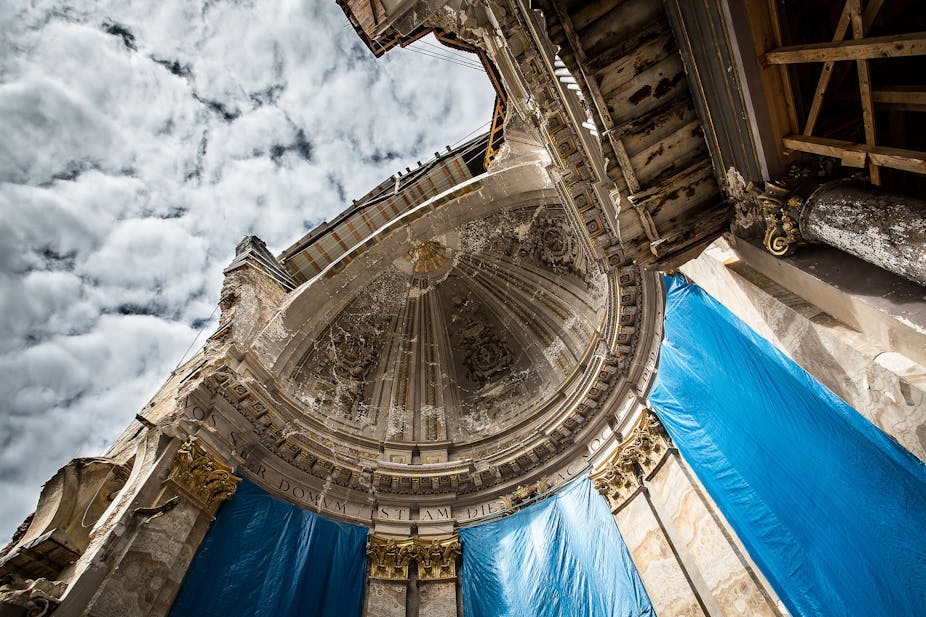It has been five years since an earthquake hit the Italian city of L’Aquila leaving 309 people dead. In the aftermath one public official and six earthquake scientists were charged with multiple counts of manslaughter. Each defendant was sentenced to six years in jail.
It is commonly believed the scientists were condemned for failing to predict the earthquake but, in truth, the case was about communicating risks to a vulnerable population. The defendants were accused by the prosecution of giving “inexact, incomplete and contradictory information”.
One of L’Aquila’s citizens succinctly articulated the position of many survivors:
We all know that the earthquake could not be predicted, and that evacuation was not an option. All we wanted was clearer information on risks in order to make our choices.
The appeal process has been ongoing but as of November 10 charges have been dropped against the scientists involved. Conspicuously, the convicted Italian official had his sentence reduced but still faces two years in prison.
Tremors and corrections
Six days prior to the earthquake scientists met with Bernardo De Bernardinis, then deputy director of Italy’s Civil Protection Agency. A local laboratory technician had been making dubious predictions of an impending large earthquake. Meanwhile, smaller tremors were being experienced in the region.
The meeting was called with intentions to reassure the public. The scientists correctly emphasised to De Bernardinis that the precise timing of major earthquakes could not be known. They were careful not to rule out the possibility of a major earthquake any time.
Following their meeting De Bernardinis publicly stated: “The scientific community tells us there is no danger, because there is an ongoing discharge of energy. The situation looks favourable.” None of the scientists made an effort to correct Bernardinis’s imprecise statements.
Public officials clearly felt pressure to reassure. The overriding wish to calm citizen’s fears created a situation where risks were downplayed and scientific uncertainty was emphasised at the expense of responsible warnings.
There are obvious lessons to be gleaned from L’Aquila: clear science communication has real consequences for public safety. Political officials have a responsibility to communicate risks to the public without sacrificing the science to politically palatable messages.
Misinformation matters
However we need not endorse the L’Aquila judgements in order to consider alternative circumstances where legal penalties might be appropriately applied.
Take the purposefully organised campaigns of disinformation over lead poisoning, asbestos or tobacco, for instance. Such campaigns, generally orchestrated by vested interest groups, show a reckless disregard for public safety. Now a related campaign seeks to undermine the public’s understanding of climate science.
It is easy to feel sympathy for an Italian official who seems to have been motivated to reassure rather than mislead. Despite his failure to convey an accurate but tempered assessment of the dangers it remains true that large earthquakes really are unforeseeable in the short term. I hope his ongoing appeal process is ultimately successful.
But what do we make of politicians who doggedly deny the overwhelming evidence for human-caused global warming after receiving large sums of campaign money from the fossil fuel industry? They too emphasise scientific uncertainty at the expense of responsible warnings.
This is clearly irresponsible and dangerous. The devastation to human life resulting from unchecked climate change is magnitudes greater than the tragedy in L’Aquila and it will get worse still. We may be uncomfortable with the Italian courts, but consider the alternative: is a system which allows politicians to openly receive large sums of money from fossil fuel interests, while dismissing the greatest crisis humanity has yet faced, any better at serving the public’s interests?
We should reconsider political frameworks that allow large sums of money to shape politician’s understanding of climate science if we want to avoid cases like L'Aquila in the future.

